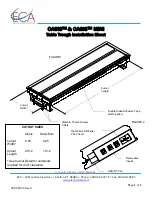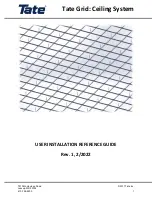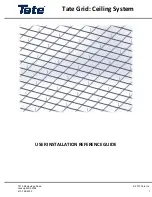
2
Section 1
An Introduction to Impulse Testing with the MegaPulse PF series tester
The impulse test is designed to simulate impulse surges which occur in everyday life due to
nearby lightning strikes, switching transients, and other high-frequency faults on the power
distribution network. Impulse testing is the fundamental method for empirical verification of the
adequacy of insulation. Other methods of ensuring adequate insulation (AC or DC Dielectric
Withstand testing, measurement of over-surface creep age, through-air clearance, or distance-
through-insulation) are all extrapolated from the results of impulse testing. The impulse test is
performed to ensure that the insulation in question will be able to function properly when
subjected to similar impulse surges in the field.
Safety Precautions
The impulse withstand test can generate voltages in excess of 12000V peak at potentially lethal
current levels. Currents of as little as 5mA at 120 volts can cause death; the MegaPulse can
deliver currents of more than 1000 Amps peak for very short time duration. The potential for
serious injury or death exists and personnel should be aware when they conduct this test.
Test Personnel
Personnel require special training to conduct the impulse test. They should understand electrical
fundamentals clearly, and be aware that high voltage is adept and creative at completing a path to
ground. Instructions should include a warning against any metal jewelry. Operators should not
allow others in the testing area, especially when tests are being conducted. Organization is to be
stressed. The operator should keep the area free of unused leads and equipment.
Testing Area
The area used for conducting the impulse test should be as remote as possible from normal
production line activities. Only personnel actually conducting the test should be allowed in the
area, and it should be taped or roped off to preclude casual entry by other employees. In
addition, the area should be marked "WARNING - HIGH VOLTAGE TESTING" or the
equivalent to warn others of the nature of the testing taking place.
The bench being used should be non-conductive, and any exposed metal parts should be tied
together and grounded. If a conductive surface must be used, it should be grounded. Because of
sparking during an impulse test failure, it is not safe to conduct impulse testing in combustible
atmospheres.
It is imperative that a good ground be provided to the MegaPulse tester. Before connecting the
equipment, ensure that the building wiring provides a low-resistance ground. If the MegaPulse
tester is used on a high-resistance grounding circuit, dangerous high voltages may be present to
the operator. In addition, the power to the Testing Area should be provided with an easily
reached shutoff switch which can be actuated by personnel outside the Area if needed.
Summary of Contents for MegaPulse 1.2x50-12.3PF-1
Page 1: ...MegaPulse IMPULSE TESTER 1 2x50 12 3PF 1 500ohm 0 5J Instruction Manual...
Page 3: ......
Page 5: ...1...
Page 12: ...8 Figure 5 Test Voltages and Tolerance from IEC 60255 5...
Page 29: ...25 Figure A 5 Breakdown as the voltage is rising...
Page 30: ...26 Figure A 6 Dieletric breakdown immediately after Vpeak...
Page 31: ...27 Figure A 7 Dielectric breakdown after Vpeak delayed breakdown...







































